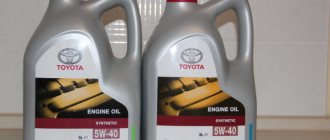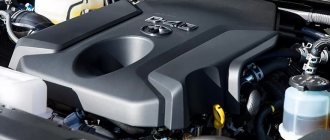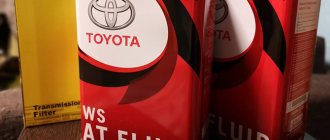| Place | Name | Characteristics in the rating |
| The best semi-synthetic oil for Toyota Corolla engine |
| 1 | XENUM NIPPON RUNNER 5W30 | The best oil for used Toyota Corolla |
| 2 | MOBIS SUPER EXTRA GASOLINE 5W-20 | Reliable motor protection during intensive use. The most affordable price |
| 3 | ENEOS SUPER GASOLINE SL 5W-30 | Best protection against friction |
| 4 | LIQUI MOLY Special Tec AA 5W-30 | Excellent frost resistance |
| 5 | TOYOTA SN 0W-20 | Excellent lubricating properties. Anti-counterfeit protection |
| The best synthetic oil for Toyota Corolla engine |
| 1 | MOBIL 1 FUEL ECONOMY 0W-30 | Best wear protection |
| 2 | TOYOTA FUEL ECONOMY 5W-30 | Manufacturer's recommendation. High fuel economy |
| 3 | IDEMITSU Zepro Eco Medalist 0W-20 | Compensates for poor fuel quality. Effectively reduces friction forces |
| 4 | Motul 8100 Eco-nergy 5W-30 | The strongest oil film |
| 5 | MANNOL Energy Formula JP 5W-30 | Affordable price. Buyer's choice |
Toyota Corolla has been produced since 1991. During this time, the model was repeatedly updated, maintaining its popularity - the brand is listed in The Guinness Book of World Records as the best-selling. When choosing the best oil for pouring into the engine of this machine, you should take into account the type of power unit and know the requirements that the manufacturer places on lubrication. In addition to the viscosity and frost resistance (SAE) parameter, it is very important to know the oil class according to API standards - it must necessarily correspond to those that are approved for use with this particular engine. In this case, one should take into account the fact that with a mileage of more than 100 thousand km. wear of the internal parts of the engine is inevitable, the distance between the friction surfaces is increased, and for proper lubrication, motor oil with a higher viscosity is required.
The review below includes the best oils suitable for filling into different engines of this car. The rating was compiled based on the requirements set by the plant, the characteristics of motor oils and the experience of use, which Corolla owners of different years of production spoke about in their reviews.
Advantages of original oil for Toyota Corolla
For the domestic market in Japan, original Toyota motor oil is produced at one Exxon Mobill plant using hydrocracking technology.
Another duplicate brand under which the same lubricant is bottled is called Castle. At the same time, the manufacturer works according to two completely different recipes. Thus, Toyota 0 W-20 and 5 W-30 oils were developed by Mobile, and when creating 5 W-20 (SL), the Esso scheme applies. Regardless of this, the product receives an effective set of anti-friction additives that ensure high oil film strength and reliable lubrication of parts under any operating conditions.
With the systematic use of OEM lubricants, scuffs on the cylinder walls are sealed, maintaining compression and engine power at new levels for a long time. The high heat capacity of the product removes excess heat in the cylinder-piston group, distributing heat evenly throughout the engine. In addition, powerful additives to remove carbon and other deposits keep the engine (inside) clean. The original engine oil for Toyota Corolla is perfectly suited to the temperature conditions in Russia, but it should be remembered that this lubricant is highly sensitive to fuel quality and has a low base number.
Properties of low-viscosity oils
Trends in the field of lubricants production are visible quite clearly. One of the areas in which Japanese engineers are working is reducing the viscosity of motor oils without losing their lubricating properties. And there is a completely logical explanation for this process.
Metalworking technologies are improving. Alloys used in engine construction are becoming more durable and resistant to stress. Taken together, this makes it possible to produce less massive parts with minimal gaps in mates.
The smaller the gap, the less lubricant is required. In addition, it is more difficult for thick liquid to make its way through narrow sections of the pipeline.
SAE Viscosity
Therefore, many motor oils for modern Toyotas have low viscosity. For example, one of the most popular lubricants today are oils with SAE viscosity 0W-20 and 5W-30. However, the line from this manufacturer includes lubricants with other viscosities.
Many motorists have a question: how to decipher the lubricant code written on the canister, and how to understand whether it fits into the engine? To do this, we will briefly consider the classifiers by which the scope of application of all lubricants today is determined.
All about Toyota engine oil. Recommended replacement intervals and application conditions - video
The SAE classification indicates viscosity only. Here, the first number with the letter “W” means low-temperature viscosity, the next one after the dash means high-temperature viscosity.
There is a table that shows the approximate temperature limits suitable for a particular oil. However, for Japanese cars this does not always work fully. It is recommended to read the operating instructions before referring to the table.
Classification of gasoline oils according to API
API classification divides oils into gasoline and diesel. Consists of two letters. The first letter indicates the type of fuel: S – gasoline, C – diesel. The next letter is generation. The further the letter is from the beginning of the alphabet, the more advanced the lubricant is in the canister.
API classification for diesel engines
The ILSAC classification includes 3 current classes: GF-3, GF-4 and GF-5. As the numerical index increases, the requirements for oil in terms of energy saving and environmental performance increase.
ACEA classification consists of a letter and a number. The letter determines the scope of application, the number indicates the generation of the lubricant:
- A – for gasoline engines;
- B – for diesel engines;
- C – for gasoline and diesel engines with exhaust gas treatment systems;
- E – for heavy industrial equipment.
Toyota lubricants are characterized by the first three classes. Take a closer look at the most popular lubricants on the Russian market.
The best synthetic oil for Toyota Corolla engine
Pure synthetics are the lot of modern engines that need the best high-performance lubricant that is resistant to high temperatures and oxidative processes. Good anti-friction properties and the presence of detergent additives are the key to long and reliable engine service. Below are the consumables that are the best available on the domestic market today. Their characteristics fully comply with all plant requirements, which means these oils can be safely poured into the Corolla engine.
When to change the oil
In Toyota cars, the oil should be changed regularly to prevent internal damage or damage to the engine, gearbox, and power steering. Depending on the intensity of use and loads, the frequency and duration are different.
To maintain engine performance and extend its service life, it is recommended to replace it every 5000-7500 km, but at least once a year.
It is worth separately noting the importance of engine hours in the timing of oil changes. So, 250 engine hours is the best indicator for replacement if the car is used mainly in city traffic (but keep in mind that the traffic intensity in each city is individual, so in some cases an oil change is acceptable a little earlier, for example, after 200 engine hours). 300 engine hours is the optimal value for a motor used without any load (mostly on the highway).
Using the form below, you have the opportunity to calculate the number of operating hours of your engine; to do this, simply enter the mileage from the last oil change and the average speed for this period:
Engine hours: ...
It is possible to change the engine oil after 10,000 km, but subject to moderate loads on the engine. As a rule, replacement at such an interval is acceptable when traveling mostly outside the city, and if your city/highway ratio is not 90/10 or 80/20, like most.
If for some reason you are not able to calculate the number of engine hours, we recommend using the form below, with which you can determine the optimal interval for your car’s engine. But, it is worth noting that if in your case the car is used in difficult conditions, then it is recommended to reduce the interval.
How to determine the original
Despite the prevailing opinion that Toyota lubricants in tins are almost never counterfeited, counterfeit copies in tin containers are also common on the market.
According to research by one of the sales managers of original Toyota oils, counterfeits in cans make up about 30% of the total on the market.
Therefore, purchasing lubricant in metal containers, although it minimizes the likelihood of running into counterfeit products, does not completely eliminate it. The fact is that today counterfeit manufacturers have reached such a level that even specialists are often unable to distinguish a fake from an original.
Moreover, there are cases where an original oil, but produced at a different plant, was called a fake due to very minor differences in the container and label (less clear imprint of the bottling date, different welding of seams, minimal differences in label printing, etc.) .
At the same time, high-quality counterfeits underwent visual inspection by specialists. Very crude fakes can be distinguished from the original. For example, with a missing protective engraving on the cap, an irregularly shaped canister, or obvious differences in the label from the original one.
How to check the condition of the lubricant?
With prolonged use, transmission fluid gradually loses its properties. If there are interruptions in the operation of the gearbox or there are suspicions about the condition of the lubricant, you can check it.
Pour a little oil from the unit onto a clean cotton napkin or piece of light-colored fabric. The gearbox requires repair and complete replacement of the ATF if:
- there is a burning smell;
- the liquid has a black tint;
- there are various impurities;
- The grease has acquired a thick consistency.
As long as the viscosity, orange or red hue and sufficient level are maintained, no manipulations with the oil are necessary. It is enough to use diagnostics to identify the reason for the incorrect operation of the unit.
How to choose ATF?
When it comes to updating consumables, motorists are often lost because they simply do not know what gear oil to fill in a Toyota.
Experts recommend “maintaining” the brand, that is, using the lubricant used by the manufacturer.
If it is difficult to purchase, then you should contact a specialized service for advice, or carefully study the operating conditions. Often the characteristics and brands of consumables are indicated there.
Why is gearbox lubricant needed?
The transmission has many components and moving parts that require lubricant.
Oil in any type of gearbox is also necessary to ensure a smooth transition from speed to speed and to remove heat from heating components to the unit body.
In an automatic transmission, transmission fluid (ATF) is needed to transmit engine power from the torque converter turbine (GTF) to the centripetal wheel. It should also be noted that the GTF unit itself will not work without oil.
Engine Toyota 1NZ FE
The 1NZFE is a four-cylinder in-line engine. It has a VVTi type variable valve timing system on the intake camshaft. However, after modernization, the manufacturer installed hydraulic compensators on the 1NZFE. Now car owners do not need to visit a service station after every 30 thousand kilometers to adjust the valves.
This series is still in production today. It is installed on 17 modifications of Toyota vehicles. It is a reliable engine with a mileage of up to 700 thousand kilometers with proper care and annual service.
Attention! 1NZFE, unlike the ZZ series, after a run of 150 thousand kilometers, they begin to actively absorb lubricant. This happens because the oil scraper rings are coked. You may have to replace them and the caps.
The following problems often appear on 1NZFE due to the fault of car owners:
- The oil pressure sensor fails;
- The rear crankshaft oil seal is leaking;
- The cylinder block wears out after a mileage of 200 thousand kilometers.
This happens because they poured low-quality oil not recommended by the manufacturer. A mismatch in viscosity leads to overheating and friction of 1NZFE metal parts.
In addition, these Japanese engines are not subject to major repairs from the first moment of their appearance. Therefore, experienced mechanics recommend pouring only branded lubricant or its analogues.
Motul
Among the products of the Motul concern there are many suitable motor oils for Toyota and Lexus cars. Cars with a gasoline engine will work perfectly on synthetic oils:
- Motul 8100 Eco-lite0W-20 - energy-saving oil;
- 8100 Eco-lite5W-20 - energy-saving oil for engines that require oils with low HTHS viscosity;
- 8100 Eco-nergy5W-30 - popular energy-saving oil;
- 6100 Syn-clean 5W40 is an oil produced using Technosynthese technology for engines of Euro 4, 5 and 6 standards.
For Toyota diesel engines, Motul recommends the following oils:
- 8100 Eco-clean5W-30 C2 - oil for Euro-4 engines;
- 8100 X-clean5W-40 Gen2 - energy-saving oil for Euro-4 engines;
- Motul 6100 Syn-clean 5W40 is an oil produced using Technosynthese technology for engines of Euro 4, 5 and 6 standards.
How often should the gearbox lubricant be changed?
Many motorists are confident that oil is poured into the Toyota gearbox once for the entire service life. But this opinion is erroneous, although this is indicated in the operating conditions of most global automobile brands.
Japanese manufacturers have limited the operation of transmission fluid to 160 thousand km. Although it all depends on the conditions in which the car has to “ride”.
If we take into account the domestic climate and poor road surface, not to mention off-road driving, then the best option is to change the gearbox oil every 30, maximum 50,000 km.
Price policy
Original spare parts and consumables for Toyota are not cheap. If, when components wear out, it is possible to save money by choosing a high-quality analogue, then when purchasing a lubricant, it is better to strictly adhere to the manufacturers’ recommendations.
The minimum price for oil for Toyota cars is 350 rubles per 1 liter. This is the Toyota TIPE T-IV brand. The approximate cost of Mobil 3309 is 450-500 rubles for a similar volume, and Dexron III will cost 50-100 rubles more.
Which brand of 5w 40 oil to choose: review of the best motor oils of 2021 (110 photos + video)Which gear oil is best? 2021 rating and tips on how to choose the right gear oil and lubricant (115 photos)
Which Lukoil oil is better to choose? Manufacturer's assortment, pros and cons. Rating 2021 (120 photos and videos)
Verdict
An excellent branded oil, made exactly according to the recipe. Economical and efficient, fights deposits well, and ensures stable engine starting in cold weather. I am especially pleased with the careful handling of oil with the oil seals of used cars; you can safely pour it without fear of leakage.
The only thing that personally bothers me about this oil is its rather low kinetic viscosity. It fits into the SAE J300 standard, the oil may be called 5W-40, but such a viscosity may not provide a sufficiently strong film under high loads, but it saves fuel. If you use a car in extreme conditions, you should think about whether to pour it or not to pour it. For normal conditions of use, the oil is optimal in all respects.
Motor lubricant
In addition to the gearbox, a Toyota car also requires engine oil. Almost all motorists know how to check the level of this lubricant.
How to navigate the brand, since on some models of Japanese cars the recommended oil characteristics are stamped directly on the dipstick.
If checking the level and selecting a brand for an engine is much easier than for a gearbox, then drivers face another danger.
Among the offered motor oils there is a classification by type:
- mineral, which is recommended for engines with significant mileage;
- synthetic, which has the longest service life;
- semi-synthetic, which has good properties for domestic consumers, with the exception of frost resistance;
- hydrocracking mineral (HC), widely used in Asian and American markets, suitable for mild climates.
IMPORTANT! You cannot mix 2 different types of oil with each other, as this can cause engine damage.
Which automatic transmission oil is better? Review of the best transmission oils and tips for choosing them (100 photos and videos)Which antifreeze is better? Rating of the best compounds and their manufacturers. Review of antifreeze 2021 (105 photos)
Which winter diesel is better? Operating rules and features of choosing diesel fuel at low temperatures (110 photos)
Change of oil
There are two ways to change the oil on a Toyota: at a specialized service station or yourself. The first method is more expensive, the second requires easy access to the drain plug and the availability of appropriate tools.
Replace it yourself
To change the oil yourself, you first need to let the engine cool, then unscrew the drain plug at the bottom of the oil pan and drain the oil.
When the oil is drained, we recommend removing and replacing the oil filter. When the oil is completely drained, tighten the drain plug and fill the volume of new oil required for the engine through the appropriate neck. Start the engine and check for leaks.
During the oil change procedure, we recommend paying attention to the condition of the engine seals, the amount of oil drained, and also note the service date and mileage.
Motor oil: production process
The health of a car’s engine directly depends on the quality of the lubricant.
The manufacturer is guided by the positional requirements of his car. Various materials are used as a basis for the manufacture of engine parts. All “chemistry” begins precisely from the interaction of additives that may be contained in synthetic oil. We can say for sure that the formula of oils created from different manufacturers is not identical.
For one car it can work for the benefit, but for another it can have a detrimental effect on the engine. For example, corrode the piston ring. You should not “fill” the engines of your cars with lubricant on the advice of a friend or a guy from a car forum. Before buying, read the characteristics of the product and decide what you need, look at the machine’s documents and service book.
Contact a good dealer - he should always provide several options to choose from, without focusing on the most expensive. The manufacturer initially tried to anticipate the different ranges of application of its products. Any original Toyota oil takes a leading position among its competitors. All Toyota oils are created based on 5 main parameters: cleaning, lubrication, cooling, sealing, corrosion protection.
Types of Toyota motor oils
On the domestic market, the Japanese company Toyota offers a full range of motor oils for cars not only of its own production, but also of other brands. Production is carried out in several factories that are distributed throughout the world.
To maintain the performance of your engine, you must take an extremely responsible approach to choosing engine oil. It is best to purchase it from official representatives or in specialized stores. There you will definitely find an original and completely safe product.
Toyota 5W-40
Toyota 5W-40 is a synthetic motor oil produced by this Japanese brand. It meets all necessary quality standards and complies with API requirements. This product is intended for gasoline and diesel engines. According to the standards, this oil corresponds to the following values:
- BMW (LL98-99);
- Porsche CF;
- Volkswagen 502, 503, 505.
In addition, this oil is poured into absolutely all engines of Toyota cars after 2009. The product is characterized by high fluidity. It is extremely resistant to any temperature changes. The chemical composition contains special additives that increase the efficiency of the power unit.
Toyota 0W-30
Nulevka is a high-quality and universal oil. It is suitable for all modern gasoline and diesel engines. Thanks to a special chemical composition, better and safer engine starting is ensured in the cold season.
In addition, the use of this oil improves the efficiency of the power unit. Oil of this viscosity meets 2 standards:
- ACEA;
- API.
Observations have shown that this product is the most popular on the Russian market. Its only drawback is its high cost. One liter of oil can be purchased for 800 rubles.
5w30SN
Toyota 5w30 SN oil is one of the most popular products on the domestic market. It meets the highest quality standards.
Oil brands for Toyota
When completely replacing the transmission fluid at a service station, specialists will select the necessary lubricant, taking into account its characteristics.
When purchasing on your own, the following brands are suitable for Toyota cars:
- Mobil 3309;
- Top Tec 1200;
- Toyota Dexron III;
- Toyota WS;
- Toyota TIPE T-IV.
IMPORTANT! The oil container must have ATF symbols on its label.











